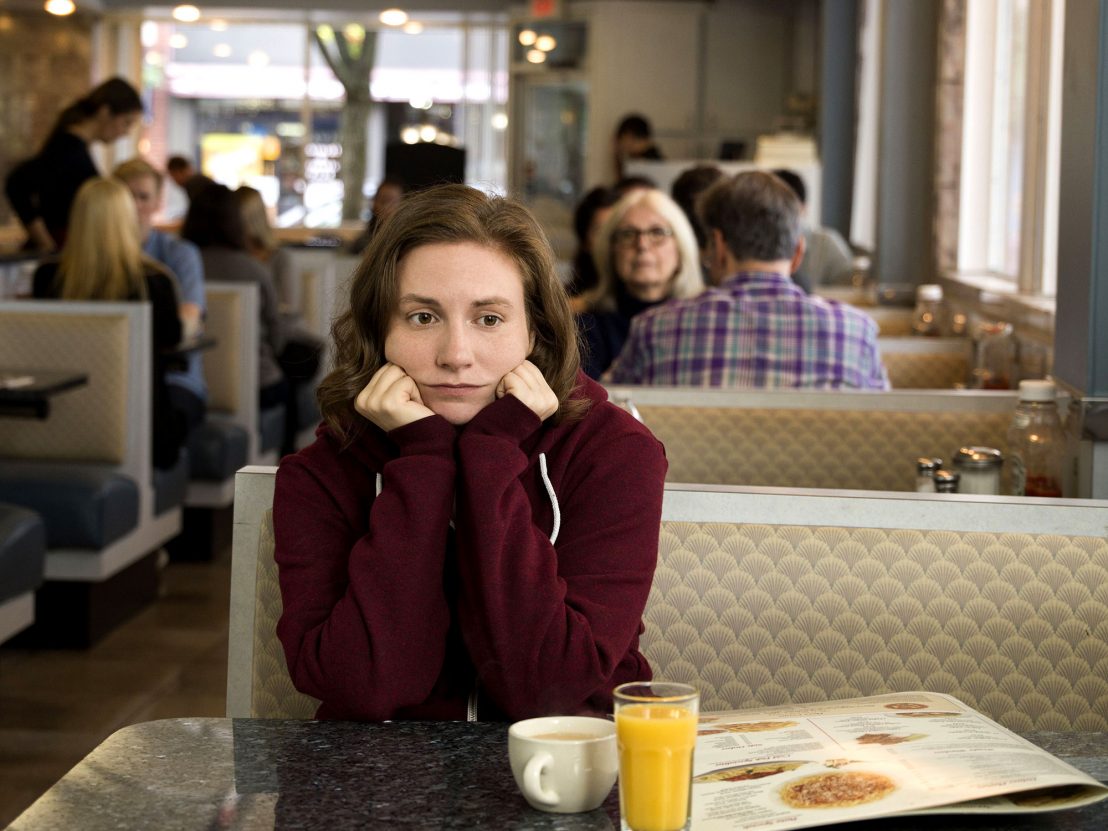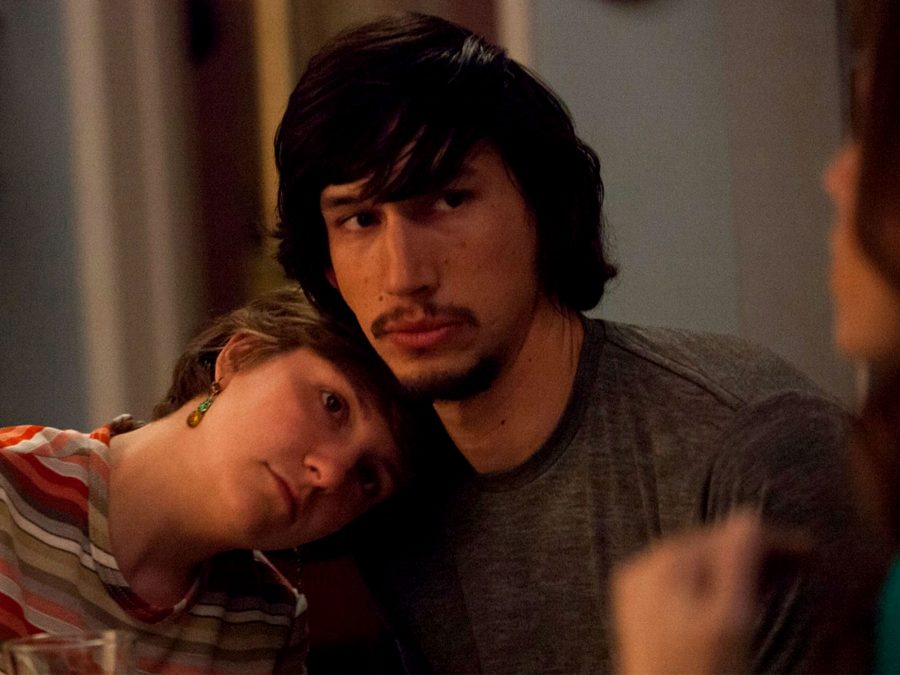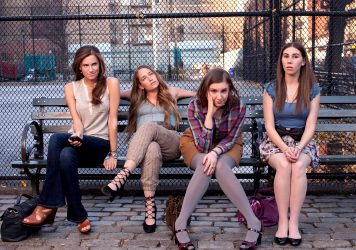
I was a late-bloomer to HBO’s Girls and, once I finally started watching it, it took me around two seasons to decide whether I actually liked it or not. The fact that I had made it through two seasons obviously suggested that there was enough to like about the show to keep me coming back, but for the life of me I couldn’t put my finger on exactly what the attraction was.
I wasn’t particularly fond of Lena Dunham’s Hannah Horvath – in fact, at times, I covered my ears, incapable of listening to yet another self-absorbed whiney monologue, and this is something I usually only ever do when my partner is watching some gruesome horror movie and I’m trying to drown out the crushing of bones and the gushing of blood.
Yes, that’s how much Hannah’s narcissistic musings grated on my nerves; at times, I would have preferred listening to The Walking Dead’s soundtrack of zombie-slaughter. And yet I continued to tune into the lives of four infuriatingly self-centred 20-year-old women on a weekly basis, determined to find out what it was that kept drawing me back in. Then one day it finally clicked: these girls are real, well-rounded personalities, and they’re not afraid to be assholes – I’d even go as far as to say, they thrive on being assholes.
Having rewatched the entire series in order to pump myself up for the grand finale, I realised that what initially unsettled me, ironically, were the three things I crave the most from exactly these kinds of TV shows: credible pacing, body diversity, and fully fleshed characters. In all honesty I was so thrown by seeing a show that nailed all three counts so perfectly, it took time to process. Girls brought a new vision to TV, one I had never experienced before – not only do Hannah and Jessa proudly show off bodies I can actually identify with, they also own every part of their warped personalities in a manner only few other TV writers allow their characters to do.
Whether we’re looking at Shoshanna’s obsession with status and her unjustified snobbery, Marnie’s vexing sense of entitlement, or Jessa’s chaotic drive for self-destruction – ultimately, they are all in search of something and they are fiercely unapologetic about their behaviour en route to finding it. In so doing, the show has become an uncomfortably comical study of millennial attitudes and the real emotions behind a ridiculed, lost generation dependant on Zoloft, online gurus and celebrities.
Though every character underwent varying degrees of personal growth spurts this season, not all were as satisfying as we would have hoped. But then, herein lies the beauty of this show. There are plenty of things that are far from credible when it comes to their lifestyles – Hannah and Marnie’s artistic career paths, Shoshanna’s apartment versus her non-existent salary, Adam’s insanely loud and violent expressions of creativity in an apartment block without ever having been threatened with cops – but these discrepancies are remedied by the down-to-earth depiction of real, human experiences that don’t always have a happy ending.

I would have loved to have seen Shoshanna (Zosia Mamet) succeed in Japan in season five, and I even would have been happy to see her rekindle her relationship with Ray (Alex Karpovsky), which reached a touchingly intimate level in the series’ finale season. Instead, she was denied this sense of personal growth by having chosen to marry what seems like the first best bidder. And while her character’s anticlimactic ending may have irked me, it befits Shoshanna’s incessant search for depth in shallow waters.
The same is true for Jessa, who, having come to terms with her faults in her relationship with Hannah and the other girls, is somehow left surfing the ambiguity of purgatory – although she was given a chance to redeem past indiscretions, she was not granted any type of outlook on her future, positive or negative. Her open-ending, as nerve-wracking as it may be, pays tribute to her character who, similarly to Elijah (Andrew Rannels), was never particularly rooted throughout the entire run of the series.
However, unlike Jessa, Elijah came out on top in Girls’ final season, and I was ecstatic to see Dunham, Jenni Konner and Judd Apatow expose Rannels’ true potential by allowing him to take centre stage in his episode ‘The Bounce’, which sees him prepare for his role in the musical White Men Can’t Jump.
It had already been announced that Girls’ final ever episode, ‘Latching’, would only include one of Hannah’s friends, in an attempt to avoid the sitcom-style montage approach usually reserved for show finales. And while it worked well in that closure was already found in the penultimate ‘The Goodbye Tour’, ‘Latching’ was guilty of being a series’ finale that teased new beginnings.
With only Hannah, Marnie and Loreen and Hannah’s non-latching new born Grover present in a wholly new, suburban environment, it felt more like a final season opener that should have been titled ‘When Girls Become Women’. Although it did little in terms of offering a satisfying ending to an important TV era, it celebrated six years of inexplicable bonds, maddening characters and memorable dialogues in true Girls fashion – in other words, this episode like many before will age like wine: the longer you let it sit, the clearer the intentions of the writers will become, and the better it will become.
In its final episode, Girls revisits the strongest hate-love relationship on the show in order to provide it with a much-needed conclusion brought on by Becky Ann Baker’s incredible Loreen. Feeling inadequate and desperately wanting to out-friend all of Hannah’s other friends, Marnie takes it upon herself to help raise Grover – not because she particularly wants to, but because, as always, she needs a new storyline that will prove to herself and others that she is indeed a good, selfless person.
She takes on the task with the same Google-schooled conviction as she did her divorce, and all the while you can see the Instagram-style film reel she imagines herself featuring in inside her head. Her intentions are partially good as she tries to support Hannah through her breastfeeding issues, but her reasons for staying are more caught up with leverage to hold over Hannah’s head in future years than anything else.
Bringing Marnie and Hannah back together for ‘Latching’ feels like a conscious decision the writers made to emphasise that personal growth doesn’t necessarily apply to all areas of your life, and it certainly doesn’t happen overnight. Together, Marnie and Hannah quickly fall back into their former, self-obsessed and competitive habits, but left to their own devices – whether this means FaceSexing some guy, or having it out with a random teenaged brat – they find the space to grow into the women they are meant to be.
A revealing conversation with Loreen makes Marnie realise the toxicity levels her friendship with Hannah has reached, compelling her to seriously consider her future for the first time in a long while. And Hannah, who had already exhibited signs of maternal warmth in episodes like ‘Gummies’, finally comes to understand what motherhood constitutes in all its lonely, emotional and frightening glory and, as always, she makes no excuses about her behaviour whilst finding her way.
Going out on a breastfeeding metaphor, Girls reinforces the message it has been relaying all along: just because Hollywood notions and social media warriors dictate bonds can only be formed in one particular, all-approved manner, it doesn’t mean that the same approach works for everyone. Whether you’re feeding on formula, or have latched on to liquid gold – we’re all just winging it in this thing called life, and the source of your nourishment doesn’t matter as much as the love with which it is made.
Published 18 Apr 2017

Though criticised from the start, Lena Dunham’s show paved the way for an exciting mix of millennial voices.

By Eve Watling
2017 is shaping up to be an exceptional year for women behind the camera.

Gillian Jacobs and Paul Rust’s characters are valued as individuals before they become a couple.